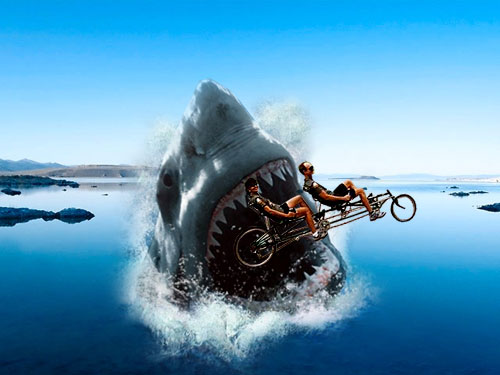As if there’s not enough biting going on at the World Cup, we now learn that the Shark Attack Capital of Brazil is Recife, where the US team lost/won yesterday. Apparently, the sharks in that area are feisty enough that the beach lifeguards do their training in a swimming pool, a practice that no doubt engenders all sorts of confidence in Brazilian beach goers.
Brazil is pretty far from Texas…but that doesn’t mean we’re safe, and now we can see just how unsafe we are thanks to the OCEARCH Global Shark Tracker, which shows real time updates of the movement of sharks that have been tagged for satellite tracking. Granted, it’s a very cool use of technology, even if it serves to reinforce the feeling that in some things, ignorance is indeed bliss.
This is particularly true in the case of Katharine and Betsy, sweet feminine names for cold-blooded eating machines otherwise known as Great White Sharks. These ladies have made their way 5,000 and 3,500 miles, respectively, from Cape Cod into the Gulf of Mexico, with movement roughly in the direction of Texas and Louisiana. Thanks to the OCEARCH website, you can assess whether it truly is safe to go back in the water.
Sort of. Because two questions come to my mind. First, shark tracking works only when the beasts surface long enough (at least 90 seconds) for the satellite to get a geoposition. Since sharks are fish and don’t have to surface other than to snack on a tasty surfer, the truth is that we don’t really know where these sharks are or are heading. And, more importantly, only a relative handful of sharks have been tagged, meaning that potentially billions more are right this minute heading for your shoreline…or riverbed…or lake house…
Fortunately for us, bicycling has been shown over the years to be a relatively shark-free endeavor. Still…

Discover more from The Fire Ant Gazette
Subscribe to get the latest posts sent to your email.
